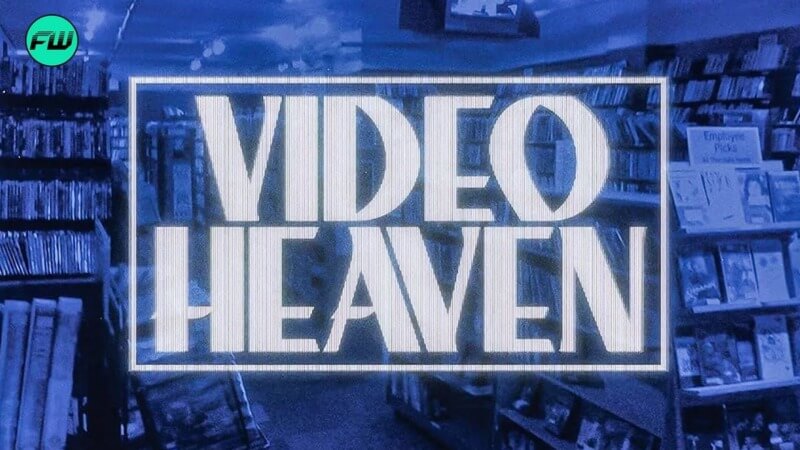Videoheaven Is a Nostalgic, Bloated Tribute to Video Store Culture

The experience of visiting the neighborhood video store, engaging in a social custom in the course of browsing the aisles to select a film to bring home to watch, tends to be a memory held with a certain nostalgic reverence by any film lover over a certain age. If you were a child or teenager in the 1980s or 1990s, then the idea of the video store is likely a formative one: The first place where you encountered frightening or gory VHS or DVD covers (my mind immediately goes to Hellraiser and Pinhead), or dalliances into the forbidden room behind the beaded curtain, which housed the hushed “adult section.” Filmmaker Alex Ross Perry’s new documentary Videoheaven would seem to be a loving tribute to this era in general, to the shared communal experience that is all but forgotten at this point by anyone under the age of 20, but in truth the sprawling assembly of footage–because it does feel considerably more like a YouTube video essay than a genuine feature documentary–is instead an obsessive, often pedantically detailed examination of how the video store has been portrayed in entertainment and news media through both its life and afterlife. With an incredibly deep and frankly excessive wealth of archival footage at its disposal, Perry examines filmic versions of the video store experience, drawing conclusions about what they meant to us, how filmmakers used them, and how we processed the end of the video store era.
One will be very unsurprised to find that Perry (who also directed this year’s well-received Pavements) was of course a former video clerk himself, as only someone who had worked in that role would have ever made this film, or thought to focus in such length–at times interminable–on the depiction of tropes such as cinematic depictions of the video store clerk. The film likewise examines other tropes at length, from the video store as an illicit gateway to the world of sex and violence, to its evolution into a bastion of family friendly entertainment, to its role as a breeding ground for awkward social and romantic interaction. This might sound like an academic survey of a particular niche within media, but Perry does not spare his own opinion, which can frequently make Videoheaven take on an air of bitterness; an old video clerk’s long-delayed airing of grievances against the character archetype he had been lumped into by the very films he so loves.
Perry’s film attempts to distance himself from what could feel like a screed, however, by instead centering the voice of actress Maya Hawke as the narrator–the only voice we ever hear in Videoheaven, which does not feature any talking head-type interviewing, another aspect that makes it something other than traditional documentary. This is an interesting choice, as Hawke’s dulcet tones and entertaining delivery do function to soften what would otherwise more obviously come off with an air of bitterness. But it’s also an odd one, as the film never really acknowledges the identity of its narrator outside of the credits: Not even when it’s opening with her describing a scene from 2000’s Hamlet, which stars her own father Ethan Hawke wandering a video store aisles as he delivers the “to be, or not to be,” soliloquy. What does Hawke feel, seeing her dad in his prime, in a setting she’s almost too young to have fully experienced, but that is deeply connected to the history of her chosen career? What does she think about having likewise played a 1980s video clerk herself as a character on Netflix’s Stranger Things? We see that footage as well, without Hawke being free to acknowledge that footage of herself is currently unspooling on screen. On one hand, it’s a cinematic in-joke for the audience of Videoheaven, who will almost certainly be aware of Hawke’s connection to both Stranger Things and Hamlet. But simultaneously, it’s also a missed opportunity to include the perspective of a second viewpoint, someone who grew up in the dying days of the video store. Instead, the actress/singer (Perry directed several of her music videos) is just used as a mouthpiece for the director’s opinions, giving them a more mellifluous air.
There’s also no getting around the fact that Videoheaven is both gratuitously overstuffed at nearly three hours in length, and occasionally quite sloppy. This is highlighted in the most surreal of fashions only 10 minutes into the film, when Hawke’s narrator reads the following line, part of Videoheaven’s overall thesis: “The video store went from being mysterious and dangerous to representing a broad, unremarkable part of daily life.” Would you believe that the very next words from Hawke, some 20 or 30 seconds later, is another take of the exact same line, repeated verbatim? It’s such a basic flub that I immediately had to rewind to be certain that I hadn’t somehow imagined it. For a film that was reportedly “10 years in the making” and premiered at Tribeca, did no one actually watch the first 10 minutes of it before signing off on the final assembly? How does such an embarrassing error see the light of day? It’s genuinely perplexing.